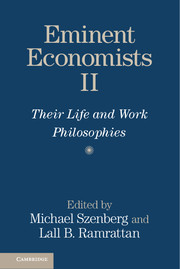Book contents
- Frontmatter
- Dedication
- Contents
- List of Contributors
- Foreword
- Preface and Acknowledgments
- Introduction
- 1 Being There: An Intellectual Journey
- 2 Social Norms in Economics and in the Economics Profession
- 3 Personal Reflections on My Professional Life
- 4 Gray Eminence?
- 5 Biochemist to Economist
- 6 Puzzles and Paradoxes: A Life in Applied Economics
- 7 Succeeding in Economics
- 8 My Research Strategy
- 9 My Philosophy of Economics, Life, and Everything (Not!)
- 10 Finding a Niche
- 11 Become an Economist – See the World
- 12 Practitioner of the Dismal Science? Who, Me? Couldn’t Be!!
- 13 One Job, Four Careers
- 14 My Life and Research Strategy
- 15 How I Ended Up Being a Multifaceted Economist and the Mentors I Have Had
- 16 Searching for My Personal Philosophy
- 17 Learning about the Evolving International Economy
- 18 Confessions of a Wellesley FEM
- 19 God, Ants, and Thomas Bayes
- 20 The Path of a Monetary Economist
- 21 Learning from the Field
- 22 Order in and through Disorder: The Invisible Hand as a Turbulent Regulator
- 23 The Education of an Economist
- 24 Faith, Science, and Religion
- 25 My Studies in International Economics
- 26 Sailing into the Wind
- 27 My Life and Work Philosophy
- 28 Scaling Fortress Economics
- 29 The Accidental Economist
- Index
- References
18 - Confessions of a Wellesley FEM
Published online by Cambridge University Press: 05 June 2014
- Frontmatter
- Dedication
- Contents
- List of Contributors
- Foreword
- Preface and Acknowledgments
- Introduction
- 1 Being There: An Intellectual Journey
- 2 Social Norms in Economics and in the Economics Profession
- 3 Personal Reflections on My Professional Life
- 4 Gray Eminence?
- 5 Biochemist to Economist
- 6 Puzzles and Paradoxes: A Life in Applied Economics
- 7 Succeeding in Economics
- 8 My Research Strategy
- 9 My Philosophy of Economics, Life, and Everything (Not!)
- 10 Finding a Niche
- 11 Become an Economist – See the World
- 12 Practitioner of the Dismal Science? Who, Me? Couldn’t Be!!
- 13 One Job, Four Careers
- 14 My Life and Research Strategy
- 15 How I Ended Up Being a Multifaceted Economist and the Mentors I Have Had
- 16 Searching for My Personal Philosophy
- 17 Learning about the Evolving International Economy
- 18 Confessions of a Wellesley FEM
- 19 God, Ants, and Thomas Bayes
- 20 The Path of a Monetary Economist
- 21 Learning from the Field
- 22 Order in and through Disorder: The Invisible Hand as a Turbulent Regulator
- 23 The Education of an Economist
- 24 Faith, Science, and Religion
- 25 My Studies in International Economics
- 26 Sailing into the Wind
- 27 My Life and Work Philosophy
- 28 Scaling Fortress Economics
- 29 The Accidental Economist
- Index
- References
Summary
I enrolled in my first economics course in 1963, my freshman year at Wellesley College, which was then, and still is, only for women. On the first day of class, my thirty freshman classmates and I eagerly awaited the arrival of our teacher. When she entered the classroom, she immediately announced that, as the chair of the department, she got to choose which section to teach, and she chose ours. Her intent was to share with us her excitement about the field and to send a signal that economics was very much an appropriate field for women. The teacher was Carolyn Shaw Bell, who later founded the American Economic Association’s Committee on the Status of Women in the Economics Profession. That first course inspired me to join the ranks of Wellesley FEMs – her term for female economics majors. Little did I understand at the time the intellectual opportunities that were then opening up for me.
My Life History
I was raised as a provincial New Englander. My parents, all my grandparents, and many of my great-grandparents lived in New England, with most of them spending much of their lives in the Boston area. The men in the family all went to Harvard College, and my mother and two of my aunts went to Wellesley College in a Boston suburb. It was clear to me that Boston was the center of the universe, and for men a Harvard degree was the key to a successful life. When I was ready for college, the choice was obvious. I applied early decision to Wellesley, without considering any other place. Later when I was ready for graduate school, I applied only to Harvard.
- Type
- Chapter
- Information
- Eminent Economists IITheir Life and Work Philosophies, pp. 249 - 269Publisher: Cambridge University PressPrint publication year: 2014
References
- 1
- Cited by

